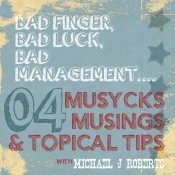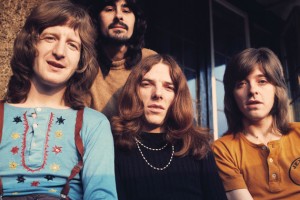Musycks Musings & Topical Tips 04: Badfinger, bad luck, bad management…

Badfinger, bad luck, bad management… and the accidental standard.
A weekly column by Inside Songwriting contributor, Michael J Roberts.
Most aspiring writers dream of coming up with a standard, a song so compelling and assured it connects to the collective subconscious and becomes an ongoing feature of the musical landscape, a song for the ages. Some arrive through immense effort and hard work, some arrive unexpectedly (McCartney’s Yesterday came to him in a dream) and some just accidently happen, one such tune is Pete Ham and Tom Evans’ Without You.
When Apple Was Apple
Pete Ham was a talented musician and writer from Swansea, lured to London in the mid ‘60s along with his band The Iveys. All ’round Beatle fixer and road manager Mal Evans saw them in 1968 and recommended them to the aforementioned Macca as a band to sign to the Beatles’ new label, Apple Records. Paul liked what he heard and The Iveys became the first band signed to the ultra-hip label, recording an album called Maybe Tomorrow. Apple were not happy with the album and withheld it from US and UK release, but it came out in Italy, Japan and West Germany. The label then decided on a change of direction with the band, giving them a new name, a McCartney penned hit single and songs on a film starring the Beatles drummer, Ringo.
“We want to do it a bit different…”
The film was called The Magic Christian and the song McCartney wrote for the band was the smash hit Come and Get It, a top 10 hit on both sides of the Atlantic, the newly christened Badfinger were away. The label conjured up a name after a John Lennon piano boogie tune, Badfinger Blues, so-called after John hurt his hand and had trouble playing the piano part on what would become With A Little Help From My Friends . The young lads couldn’t believe their luck when Paul came around to produce the session but they had ideas for changing the demo arrangement. McCartney insisted they play it exactly as he did on the demo, as Paul recalled, “They were a young band … they said, ‘We want to do it a bit different, wanna get our own thing in’. I said ‘No, this has gotta be exactly like this, ‘cos this is the hit’.” The accompanying album was a mash of the new songs Badfinger had written for the film and choice tracks from the Ivey’s album, but founding member Ron Griffiths was forced out of the band to be replaced by another Liverpudlian called Joey Molland. Tom Evans, also from Liverpool had joined earlier and all three Ham, Evans and Molland were suddenly writers in a hit band on a hot label in London, then the pop music centre of the universe.
The three writers contributed separately to the next album, No Dice, Ham providing the hit single No Matter What, to consolidate the success of Come and Get It. One night in the studio, when Pete Ham was set for a rare night off with his girlfriend, Tom called him back saying he had a chorus that needed a verse. Pete said no, but his girlfriend smiled and said it was okay, only for Pete to protest saying her eyes were telling him something other than her smiling agreement, inspiring Pete to write the lyric –
“Well I can’t forget this evening, or your face as you were leaving,
but I guess that’s just the way the story goes,
You always smile but in your eyes your sorrow shows.”
Pete already had the tune to the verse, now he had a lyric, pairing it with Tom’s chorus and the song was born. The band recorded their version for No Dice but never released it as a single, not sensing its potential. They were cornered one year later by a friend of John’s, the American singer Harry Nilsson, who asked them to come to the studio to listen to his new song. Pete and Tom were then treated to Nilsson’s version of their co-write, with a soaring chorus that elevated the song to instant classic. Nilsson had reportedly heard the song at a party and thought it was a Beatles tune, he liked it so much he released it as a single and it became his biggest hit and one of the biggest selling songs of the era.
Oddly, the Badfinger version featured Pete singing the verse and Tom singing the chorus, on which he choose to render the notes in the chorus as short and snappy, holding them for one beat only. Harry decide to hold the note for a full bar, and raised it by an octave, increasing the impact by a power of ten and making the chorus an unforgettable event. The Richard Perry produced single featured a stunning string arrangement from one of the best arrangers in the business, Paul Buckmaster, augmenting the superb Nilsson vocal. No less a writer than Paul McCartney called it “the killer of all time” and the song was extensively covered before being interpreted in 1994 by arch-chanteuse Maria Carey, who took the song to the top of the charts again.
The other “Wish You Were Here”
Both Pete and Tom should have been set for life, no matter what the future had in store for their band after they left the Apple stable in 1973. The future did indeed look bright and Badfinger hooked up with a New York industry figure named Stan Polley who negotiated a multi-million dollar deal with Warner brothers in America in 1974. Sadly, it turned out that Polley was cut from the same cloth as the nefarious Allen Klein, the American spiv who shredded Apple, and soon the band was in disarray as the advance money could not be located, causing Warner to sue and withdraw the very fine Badfinger album (Wish You Were Here), an album that they had released only a few weeks earlier.
Pete Ham had worked hard and had a young family to support, seeing his career in tatters he went on a drinking binge one night with Evans that resulted in him being found hanged in his garage the next morning by his 8 month pregnant girlfriend Anne. The sensitive and introspective Ham wrote a suicide note that concluded, “Stan Polley is a soulless bastard, I will take him with me”. The sombre spectre that shrouded the band was amplified some 8 years after Ham’s death, when his partner in creating the tender ballad whose chorus stated “I can’t live, if living is without you” also hanged himself. It was alleged that Tom never got over Pete’s suicide and in a further irony it seems that disputes from the other band members over the amount of royalties Without You in particular, was generating. The hit was covered widely, the amount of versions reached some 180 plus and three other Badfinger members wanted a share of the spoils, a heated phone call from Joey Molland was the trigger for Evans to join his mate Pete in death. Evans was found hanged by his wife who recalled, “Tommy said ‘I want to be where Pete is. It’s a better place than down here’ .”
Built To Last
The song remains, a bona-fide classic, a song that the writers did not recognise as a hit themselves, it took an eccentric American singer with a three octave voice to make a change to the chorus that left an indelible impression on the listener. Badfinger’s legacy is a rich and over-looked one, touted as the ‘replacement’ Beatles once the Fabs broke up they wilted under the weight of expectations and bad management, never to take their place in the pantheon of the great bands, but leaving some beautiful tunes for us as we ponder what could have been.
Another tale from the world of the songwriter, and more can be found in the ebooks on the site.
Happy writing.
Musycks.
Stay tuned for news on Michael’s forthcoming brilliant book
“Becoming A Great Songwriter”
RELATED POSTS / LINKS:
Musycks Musings & Topical Tips 01
Musycks Musings & Topical Tips 02
Musycks Musings & Topical Tips 03
Episode 8 Inside Songwriting Podcast
Episode 9 Inside Songwriting Podcast
Episode 15 Inside Songwriting Podcast
Episode 16 Inside Songwriting Podcast




